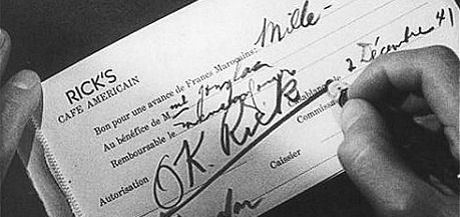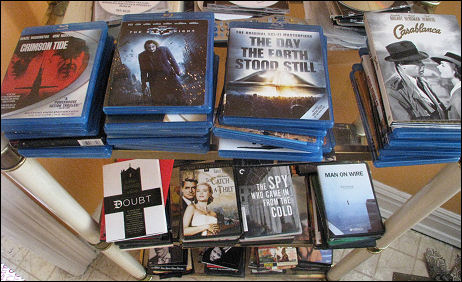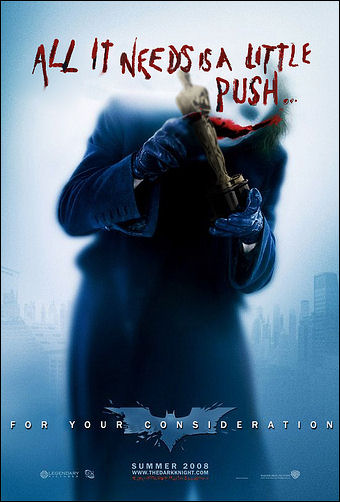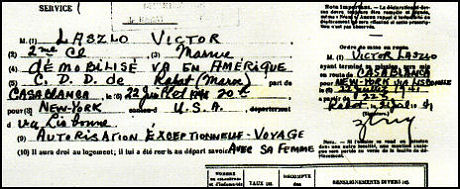I’m not saying I’m so persuaded or even in the mood to go poking around, but since we’re all pretty clear on the likely Oscar nominees, I’m wondering if there’s any yearning out there to see this or that contender taken down. I’m really not feeling any of the old fire myself (it’s been a bit of a tepid year) but does anyone out there feel anything? In terms of wanting a film or filmmaker out of contention, I mean?
Notations
Alliance of Women Film Journalists Special Mention Awards: (1) AWFJ Hall Of Shame Award to 27 Dresses; (2) Actress Most in Need Of A New Agent: Kate Hudson ; (3) Movie You Wanted To Love But Just Couldn’t (Tie) — Mamma Mia! and The Women; (4) Best Of The Fests — Hunger; (5) Unforgettable Moment Award (tie between The Dark Knight (Joker’s first scene) and Slumdog Millionaire (young Jamal jumps into the poop….what?); (6) Best Depiction Of Nudity or Sexuality (tie between Elegy and The Reader); (7) Best Seduction — Vicky Cristina Barcelona; (8) Sequel That Shouldn’t Have Been Made Award — tie between Indiana Jones and the Kingdom of the Crystal Skull and Saw V; (9) The Remake That Shouldn’t Have Been Made Award — The Women; (10) Cultural Crossover Award — Slumdog Millionaire; (11) Bravest Performance Award — Mickey Rourke in The Wrester; (12) Best Leap from Actress to Director Award — Helen Hunt, Then She Found Me; (13) Most Egregious Age Difference Between Leading Man and Love Interest —
The Wackness, Ben Kingsley and Mary-Kate Olsen.
Reason to Discharge
“Over the years, Detroit bosses kept repeating, ‘We have to make the cars people want.’ That’s why they’re in trouble. Their job is to make the cars people don’t know they want but will buy like crazy when they see them. I would have been happy with my Sony Walkman had Apple not invented the iPod. Now I can’t live without my iPod. I didn’t know I wanted it, but Apple did. Same with my Toyota hybrid.” — Thomas L. Friedman in his 12.14 N.Y. Times column.
Hail the Shoe-Thrower
Muntadhar al-Zeidi, the Egyptian journalist who threw two shoes at President Bush yesterday during a Baghdad press conference yesterday, is suddenly a new Middle-Eastern folk hero, and no wonder. Thousands of Iraqis “took to the streets today to demand al-Zeidi’s release, to hail him as a hero and to praise his insult as a proper send-off to the unpopular U.S. president,” says this AP story by Qassim Abdul-Zahra and Omar Sinan.

I agree with the angry masses. Like Peter Finch‘s Howard Beale did in Network, Muntadhar al-Zeidi has articulated a popular rage. Throwing those shoes
was an act of civil disobedience no different than Boston patriots throwing tea into the harbor. He did an impolite thing, but he didn’t use a weapon or hurt anyone and he said what an awful lot of people (myself included) feel. If the Iraqi authorities were smart, they’d let him go. With this act they would be saying to the Iraqi people, “We hear you” and “issues of bad manners to a visiting head of state aside, we don’t entirely disagree.”
Right Respect
HE reader Andrew Corks writes that he “saw Let The Right One In this year at the Tribeca Film Festival, where it took one of the top prizes, and was blown away by the overall quality of the film. It has an uncanny ability to successfully cross all genres — horror, love story, comedy, coming-of-age — combined with genuine acting and spectacular cinematography.
“Now that Let The Right One In has now picked up its second major critic’s society award, why is it still absent from the Oscar Balloon and general Oscar talks?”
Wells to Corks: I’m not looking to put it down or exclude it from anything. It’s one of the most unusual, originally conceived, genre-bending films I’ve seen in a long time. A really magnificent creep-out and a beautiful adolescent love story combined. I just didn’t like it all that much. Or rather, I like having seen it but didn’t like the way I felt as I watched it. I didn’t care for the funny-looking girl who played the little vampire. I thought the little blonde boy was way too much of a candy-ass. I didn’t like the low-rent fleurescent lighting, the constant snowstorms, the drab instiutional palette. I recognize without hesitation that it’s an exceptional film. I’m just looking forward to the American remake.
“He Was A Murderer!”
Here‘s a video of an encounter last Friday night between some anti-Che Guevara right-wing Latins and Che director Steven Soderbergh. It happened during a q & a at the Zeigfeld Theatre after a screening of both Che pics, in tandem. The video appears in mini-form on Indiewire. (Thanks to Eugene Hernandez for the tip-off.)
Effin’ Iron Man?
It’s appalling that American Film Institute’s 10 Best Films of ’08 included Iron Man — a first-rate comic book action CG flick that is nonetheless a generic wish-fulfillment power-dreams movie aimed at adolescent males of all ages. A movie, in other words, with absolutely no river running through it whatsoever other than….okay, a certain aura of coolness exuded by star Robert Downey, Jr., a vibe of wowness because the film was very profitable, and the respectable career-bump panache enjoyed by director Jon Favreau.
I guarantee that one of the AFI jurors voting for Iron Man was documentarian and filmmaker-interview smoothie Elvis Mitchell.
The rest of the AFI choices — The Curious Case of Benjamin Button, The Dark Knight, Frost/Nixon, Frozen River, Gran Torino, Milk, WALL*E, Wendy and Lucy, The Wrestler — are fine and good, but any list that leaves off Revolutionary Road, Slumdog Millionaire, Doubt, The Visitor, Nothing But the Truth and Che has definitely side-stepped some of the snap and pizazz.
Mammoth
Lukas Moodysson‘s Mammoth is a Manhattan-based yuppie-values drama that also involves time spent in Thailand by the husband character, played by Gael Garcia Bernal. (With a little tsunami action?) The wife/mother is played by Michelle Williams. Pic will screen in the main competition at the Berlin International Film Festival 2009. This European TV clip contains a longish trailer for the film.
Cop-Out America
In a Rachel Abramowitz/L.A. Times interview that ran yesterday, Revolutionary Road director Sam Mendes asserted that April Wheeler, played by Kate Winslet in the film, “is one of the great feminist heroines. She’s the only person in the movie [who’s] big enough to face the truth.

Revolutionary Road director Sam Mendes, star Kate Winslet
“You know well this is not a movie about a woman who wants to go to Paris,” Mendes says. “It’s a movie about a woman who wants her life back and can still remember the dreams she once had and is finally waking up, which a lot of people do in their 30s and 40s, who go, ‘How did I get here? This is not what I wanted. But I never made the decision, this all happened in increments — I had a child and I had to compromise and I had to do this and that and suddenly I’ve lost my way. Now I’m just like everyone else and I thought I was special.'”
April’s lament is the secret (or not-so-secret) inner story of, I would guess, at least 85% or 90% of the U.S. populace right now. Probably a much smaller percentage back in the conformist ’50s, I’m guessing. I’m also guessing that people of the present are sensing that Revolutionary Road is pushing a certain spiritual reckoning (i.e., the failure to live up to early dreams and ideals) that they’d rather not consider, especially with the continuing economic tremors out there. Hell, the collapse of the temple.
It used to be that people accepted their unexceptional but comfortable middle-classness. But ever since the ’70s (i.e., the Me Decade), the goal of across-the-board self-fulfillment — creative, professional, spiritual, sexual, economic — has been the standard, and very few have measured up.
A lot of people have money and good jobs (or had, I should say), although the general sense of social instability out there is profound right now. (The one bright light is the prospect of gradual betterment offered by Barack Obama.) A decent percentage probably feel they’re at least somewhat sexually satisfied (i.e., looking/hoping/in the game) and have a spiritual life that works for them to some extent.
But most people, I suspect, feel creatively unfulfilled to a large degree. In some cases not at all. And many feel, like April, that the main reason for this is that they caved in to conventional jobs and mass-market comforts too many times in their 20s and early 30s. Most people are probably semi-okay with this, or are telling themselves that they have a reasonably fulfilling life, but they don’t want to be nagged about any failures of spirit.
I have many shortcomings and weaknesses, but I didn’t cop out with a conventional job and go, as Al Pacino‘s detective put it in Heat, for a “regular-type life.” And this may be one reason why Revolutionary Road works for me — why, in fact, I think it’s a near-great film. Because it’s saying what I believe to be the real truth about middle-class conventional values, and about the general sense of diminishment that is always the dividend when you opt for safety above all. For me, “normal” has always been a four-letter word.
Busted
Here‘s a scan of the letter of transit that caused all the rumpus in Michael Curtiz‘s Casablanca. It’s one of the extras in the relatively new Casablanca Blu-ray box-set. Notice, however, the date that Paul Henreid‘s Victor Laszlo is travelling on — 22 Juillet 1941. And then notice the date on the gambling voucher signed by Humphrey Bogart‘s Rick at the beginning of the film — 2 Decembre 1941.

Gambling voucher signed by Humphrey Bogart’s Rick during the film’s opening minutes
Since Laszlo and Ingird Bergman’s Ilsa Lund leave on the Lisbon plane two or three days after they first walk into Rick’s Cafe Americain at the fim’s beginning, the date on the Laszlo letter of transit should obviously be 12.4 or 12.5, so we’re talking about a fairly significant screw-up here.
If I’d been in charge of putting together the Casablanca Blu-ray extras package, it would have been very, very easy to correct the date before the materials went to press. Hey — Warner Home Video did this, not me! I’m not trying to be an obsessive. I’m just reading and comparing and making a simple logical conclusion. Okay, WHV doesn’t have to fire the person who let this one slip by. It’s a forgivable blunder.
The Blu-ray Casablanca is heavenly, by the way. I’ve been watching this film since I was twelve years old, and there is a significant Blu-ray uptick in terms of ultra-minute details, tonal range and gradation (deep-midnight blacks!) and that wonderfully vivid silvery sparkle effect that great black-and-white films can and should deliver when properly mastered. I knew watching it that I was looking at something that Michael Curtiz probably never saw — not this level of picture quality. I could watch it again right now. It’s magnificent.




